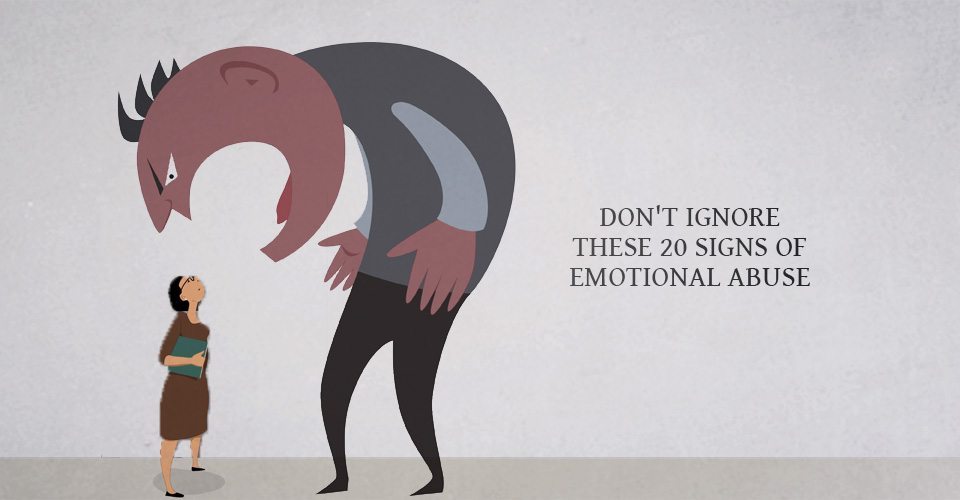Some abusers break you down from the outside in. They leave visible bruises and inflict tangible wounds. The signs of violence are physical. You can see them with your eyes and touch them with your fingertips.
Others will choose to destroy you from the inside out.
It is easy to slip into denial and rationalization in a physically abusive relationship. It’s even easier when the scars cannot be seen from the outside.
Emotional abuse is insidious because it is easy to hide and even easier to deny.
Many do not become aware of emotional abuse until it has already destroyed them.
Emotional abuse has been proven to cause as much psychological damage as physical and sexual violence. However, it is harder to stop because it is harder to identify.
If you or someone you love is a victim of emotional abuse, it is important to seek help.
These twenty behaviors might indicate that your partner is emotionally abusive:
1. You are constantly accused of things you didn’t do. You avoid healthy activities for fear that your partner will misinterpret your motives.
2. You are not allowed to see certain friends or family members as often as you would like to.
3. Your partner will not allow you to control your own finances.
4. When your partner suggests that you do something, you do not feel safe saying no.
5. Your partner decides what is best for you. This applies to your career, your clothing, and how you spend your time.
6. When your partner is upset, it always seems to be your fault.
7. You do not feel safe poking fun at your partner in the same way they poke fun at you.
8. You are always wrong, and your partner is always right.
9. You feel guilty for doing anything that does not involve your partner.
10. Your partner checks up on you often. They demand to know where you are and who you are with at all times.
11. Your partner often implies that you are the lucky one in the relationship. You feel as though you are beneath them.
12. Your ambitions and accomplishments are not taken seriously. They are secondary to your partner’s.
13. Your partner withholds affection, money, or quality time to punish you.
14. When you are upset, your partner tells you that it is your own fault for being too sensitive.
15. Your secrets and sexual encounters are not safe with your partner. They tell and show things to others that you meant to remain private.
16. You are criticized constantly, often in front of friends and family.
17. Your partner dismisses your feelings and opinions. You are expected to adopt theirs.
18. Your partner often brings up things that you are embarrassed or ashamed of.
19. You fear you partner’s disapproval.
20. You rarely make decisions without your partner’s input. Even if you strongly disagree, you usually defer to their wishes.
Lundy Bancroft examined the dynamics of abusive relationships in his book Why Does He Do That?: Inside the Minds of Angry and Controlling Men. “The scars from mental cruelty can be as deep and long-lasting as wounds from punches or slaps,” he observed, “but are often not as obvious. In fact, even among women who have experienced violence from a partner, half or more report that the man’s emotional abuse is what is causing them the greatest harm.” Do not dismiss your wounds simply because they are not physical. You deserve respect, self-esteem, and autonomy. These are more easily found alone than with a partner who demeans you.



